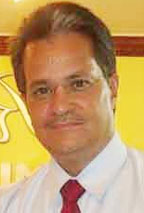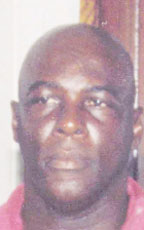-Private Sector Commission Chairman
Chairman of the Private Sector Commission (PSC), Gerry Gouveia says the public should not jump to any conclusions about testimony in a New York court linking the Guyana Government to confessed drug trafficker Roger Khan as the trial is still ongoing.

Gouveia was contacted for a comment on the revelations that have flowed from the Robert Simels’ witness tampering trial where testimony has been presented that the Guyana Government had authorized the purchase of the spy equipment which was eventually utilized by Khan. The Guyana Government has vehemently denied the contention.
Gouveia commented that the trial is still ongoing and that “we need to be patient” before jumping to conclusions.
Gouveia said that a lot of questions must be asked here in Guyana, but emphasized that all the information needs to “come out”. He referred to the trial as certainly being of interest.
Further, he said that the evidence being offered must be tested and proven, and alluded to the issue of the spy equipment saying that “there are allegations which require documents, a paper trail”.
Trade unionist Andrew Garnett says that, at a minimum, the Roger Khan confession to trafficking cocaine out of Guyana in a plea bargain with the US government has implications for the rule of law. He said that the guilty plea clearly points to illicit drugs leaving Guyana, noting this violates local laws. He added that this should trigger a probe here.
Garnett firmly stated that alleged criminal activities are to be investigated, adding that failure to do so compromises the rule of law but with respect to the Khan confession he said that an independent international body should conduct the investigations.

“It is not so much about justice being done, but that justice must appear to be done”, Garnett said. He added that there should be due process.
Speaking on the issue on Saturday Garnett said that it is in the interest of Guyanese that justice is served in the matter, adding “lets the chips fall where they may”.
Co-President of the Guyana Human Rights Association (GHRA) Mike McCormack said that there appear to be two categories of crime in the country, one prosecuted in the normal way and a second, which is beyond the scope of law and order officials. McCormack’s comments were made in the context of the allegations being raised in the US courts about murders in the country that have gone unsolved.
“There appears to be no interest in how certain people die, or instance of massive fraud or serious drugs offences. It is almost as if there are two kinds of citizens, those who the law applies to and those who are above it”, McCormack stated.
Further, he said that it is this glimpse of parallel societies which is the most frightening revelation of the New York trial involving Khan’s former attorney Simels.
The opposition political parties have met to discuss the unfolding revelations in the Simels trial in US court and what they describe as the grave implications that such revelations may have for national security and good governance in Guyana.
The unified opposition front which involves the Alliance For Change (AFC), Guyana Action Party (GAP), National Front Alliance (NFA), People’s National Congress Reform (PNCR), Unity Party and the Working People’s Alliance (WPA) have agreed that a unified approach be activated to realize greater accountability, justice, respect for and observance of the rule of law and, generally, the establishment of good governance practices.
With the public disclosure at the Simels trial by Smith Myers Co-Director, Peter Myers that a trainer was dispatched here to instruct persons to use the spy computer he says his firm sold to the Government of Guyana (GoG), there are calls for the administration to probe whether trainer Carl Chapman visited the country.
The government has not addressed claims surrounding Chapman though the trainer’s name had surfaced several months ago when Simels referred to him in an email to the UK firm.
Opposition Leader, Robert Corbin is of the opinion that Guyanese seeking answers on Chapman are being too hopeful that “the administration has any decency and or is concerned about public opinion”, adding that government has not even moved to probe more damaging claims such as its reported role in the purchase of the infamous spy equipment.
“In my opinion this [equipment] allegation far outweighs the claim that Chapman was here and should be the subject of an independent inquiry”, Corbin noted.
Corbin stated that there are two critical issues which the administration must address, firstly the allegation that it was involved in the purchase of the equipment, and secondly whether it has any links to confessed drug trafficker Khan and his phantom gang’s “execution of over 200 Guyanese”.
The issue of whether Chapman was in Guyana is important, Corbin said, adding that it would produce some amount of evidence [as to what happened] but he stressed that the deeper issue is whether there was government collusion in criminal activity.
Chairman of the Alliance For Change, Khemraj Ramjattan believes that government would likely ‘duck’ any evidence that Chapman visited rather than expose records substantiating that he was in the country.
Ramjattan said that the administration has an obligation to contact Chapman through [whatever channels are available] and verify the claims. He added that checks of immigration records could easily be made to ascertain whether Chapman was here several years ago, where he would have stayed, his contact information etc. He noted that valuable information is often logged on the immigration form.
He referred to statements made by Police Commissioner Henry Greene, who is also the Chief Immigration Officer, which pointed to him not being at the helm of the force during the Roger Khan period saying that it is in the public interest that “Greene looks back”. According to Ramjattan, it is important to look back and avoid similar mistakes in the future.
But GAP/ROAR Member of Parliament, Everall Franklin pointed to the possibility of Chapman entering the country illegally. He said that if Chapman entered the country legally then the immigration records would be available. However, he noted that “those records may have never been there”.
Franklin said that it is important to consider all the possibilities including whether Chapman came into the country using the backtrack route. He said that the trainer could have been smuggled into Guyana via Suriname, adding that it is possible given the reported mission.
“We have to examine every possibility, but if the man came here legally then the records are there and the government should provide it”, Franklin added.
There has been a string of revelations since the Simels trial commenced in the US, including Myers’ testimony under oath that his company sold the spy equipment to the GOG. He also went on record as saying that Chapman was dispatched to train persons here to use the equipment.
Government officials have repeatedly denied the allegation that the administration was linked to the equipment purchase.








